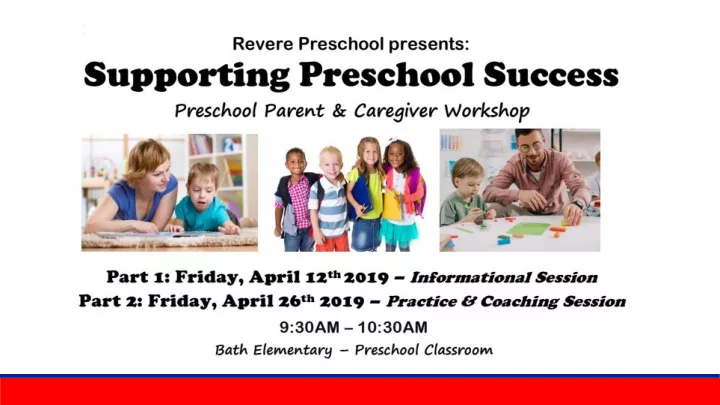

Information Session Overview Social, Emotional & Academic Expectations Importance of Early Skill Development Interpreting Children’s Perspectives & Reactions to Situations At-home Activities to Support Development
Search INSTITUTE 40 Developmental Assets for Early Childhood (ages 3 – 5)
Students Need Support to Flourish ______________________________________ Parents Play A Critical Role
MODELING Infants Can Learn the Value of Perseverance by Watching Adults After observing grown-ups struggling with tasks, 1-year-old babies make more effort themselves.
M O T I V A T I O N Self-determination Theory
Parenting Guidance Routines for families: how & why they work _______________________ Raising Children Network The Australian Parenting Website
GROWTH MINDSET Resources
SCAFFOLDING LEARNING Back-and-forth exchanges The zone of proximal development , boost children's brain response often abbreviated as ZPD , is the to language: Study Finds difference between what a learner engaging children in can do without help, and what they conversation is more important can't do. Vygotsky stated that a child for brain development than follows an adult's example and “dumping words” on them. gradually develops the ability to do certain tasks without help. Anne Trafton |MIT News Office Zone of Proximal Development February 13, 2018 Lev Vygotsky (1896 – 1934) Wikipedia
A New Framework for Understanding Parental Involvement: Setting the Stage for Academic Success Angel L. Harris & Keith Robinson
It’s a Matter of Time 12% S CHOOL 33% A SLEEP 55% A WAY FROM S CHOOL Based on 6 hours of instruction, 180 days per year, and 8 hours of sleep time. (School = 1,080 Hours) (Sleep = 2,920 Hours) ( Away from school = 4,760 Hours) 17
When your child isn’t QUITE understanding or accepting your message regarding expectations… SHOW THEM ESTABLISHED STANDARDS Share teacher feedback with your child to explain how you established your expectations Show them what a student in his/her grade should know and be able to do: Ohio hio Depa epart. . of of Ed. d.: Student and Parent State Tests Resource Portal AS THEY GET OLDER: Show them what college entrance requirements look like Search together for examples of employers’ expectations regarding required employment skills
Remind your child that improvement is a result of CONSISTENT EFFORT and that your job is not only to expect that he/she will be prepared for adulthood but to also ensure he/she gets there. It is also important to let your child know that you WANT to help him/her succeed!
Studies across the fields of education, economics, and psychology indicate that non-cognitive skills predict a variety of adult outcomes, including academic achievement, employment, financial stability, criminal behavior, and health (Gabrieli, Ansel & Krachman, 2015). THE IMPORTANCE OF NONCOGNITIVE SKILLS
Creating an Environment to Support and Encourage the Development of Self-Discipline is Your Most Important Discipline Strategy
ACADEMIC MINDSET I belong in this academic community. My ability and competence grow with my effort. I can succeed at this. This work has value for me.
ACADEMIC PERSERVERANCE Grit and Tenacity Delayed Gratification Self-Discipline Self-Control
ACADEMIC BEHAVIORS Attendance Doing Homework Organizing Materials Participating, Studying
Verbalize What You Think About When Making Decisions Things We May Consider When Buying Milk Supports: Mental Math/Reasoning Development • How much milk do we already have? When is the expiration date? • How much milk will we need until we have time to go shopping again? • Is it better to figure out how much milk we use in a day or a week? • Should we buy more milk than we normally do because we want to make a recipe that requires it or because our family is working on drinking the recommended amount of milk each day? • Is there enough room in the refrigerator for the milk we need? If not what can we do about it? • What should we do if we find that the milk in the store is expected to expire before we can get back to the store to buy more milk?
LEARNING STRATEGIES Study Skills Metacognitive Skills Self-Regulated Learning Time Management Goal Setting
SOCIAL SKILLS Interpersonal Skills Empathy and Cooperation Assertion Responsibility
Do Early Adolescents Want Family Involvement in Their Education? Hearing Voices from Those Who Matter Most
Family Emotional Support is an Important Factor to College Retention and Completion
Preschool Parent Resources Center of the Developing Child at Harvard University – “Early experiences affect the development of brain architecture, which provides the foundation for all future learning, behavior, and health.” Milestone Tracker App – The CDC created a milestone tracker mobile app to help parents track children’s developmental progress starting at 2 months and continuing through age five. Strive for Five! - Example educator resource translated into parent resource BabyCenter – Website, email and app providing advice and support on pregnancy, child development and parenting Vroom – App designed to help parents and caregivers nurture their young children’s growing minds Ready4K – Text messages to help parents prepare children for kindergarten Mind in the Making – Sharing the science of children’s learning with the general public, families and professionals who work with them Search Institute: The Developmental Relationships Framework Parent Toolkit – Early learning to college parent resource website 40 Developmental Assets (Ages 3 – 5) – Developmental Assets are 40 research-based, positive experiences and qualities that influence young people’s development, helping them become caring, responsible, and productive adults Family Support Services community-based services to assist and support parents in their role as caregivers. Zero to Three – Early Connections Last a Lifetime Resources and Services Parenting Science -- The authoritative parenting style: Warmth, rationality, and high standards
Recommend
More recommend